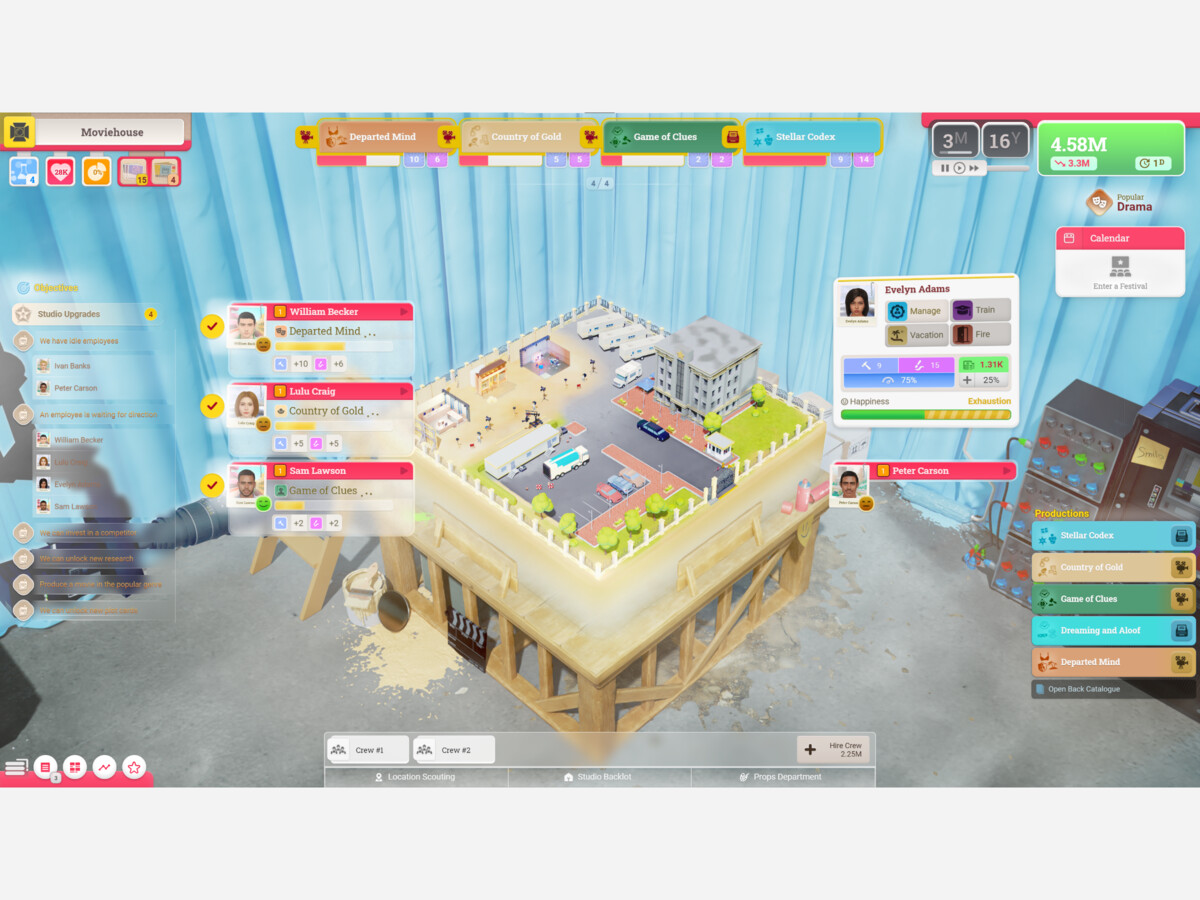Image

A little over 10 years ago, Game Dev Tycoon came out and received a lot of attention for its anti-piracy measures. It went viral because, if one downloaded a cracked version of the game for free, at a certain point piracy would cut down on the profits the player made until they ended up going bankrupt. People complained that the piracy feature was broken, not knowing that it was intentionally implemented to cut down on real-world piracy, which led to the game going viral. This is worth mentioning because a lot of the gameplay loop in Moviehouse is very obviously inspired by a cross between Game Dev Tycoon and The Movies, however, there are enough issues in the game where it does not work as well as the predecessors.
The general concept in Moviehouse is that the player assumes control of a small film production studio and makes movies. The player hires writers and directors, produces films, researches new stuff, and buys other companies to increase their market share, and eventually creates massive productions.
There are a few problems with the game on a technical level that can make it hard to play. There is too much reliance on the random number generator for multiple key gameplay aspects. In the writing stage, especially early games when you have two genres to make short films selected at random when the game begins, the game allows the player to control the narrative through cards that are random each time. Sometimes, the player can end up in a situation where none of the cards match the genre and they’re just stuck making a bad movie. To distribute at that phase, the game kind of railroads the player into using the festival circuit as a method to introduce that it is the easiest way to distribute, but there is the easier way.
Location scouting and prop design also work on the random number generation, leading to a certain amount of frustration when it comes to trying to find the right outside components for a film. Say for example a player has unlocked the western and is trying to make a moderately sized feature, there is the option to location scout to find places in the desert to shoot, however, what pace the player gets to shoot in is completely random within that and may not match the location set in the script during the writing phase. These things are essential, especially when multipliers come into play based on matching these things. The same goes for creating props where there is a list of prompts the player picks three from and hopes they get one that matches the movie they are making.
The user interface is a little unruly, with key aspects way too small to read at times which can be inhibitive. During the writing phase for example, as the player progresses, the game will remember what cards match what genres and leave a little icon at the bottom of the card but the icon is so small and they all look so similar it is hard to keep track of what is what when it comes to interpreting it. The same goes for keeping track of what the various people around the campus are doing in the writing and acting phases.
The biggest problem with the game is scaling. Scaling refers to how key systems in the game adjust as the game progresses, namely with things like leveling up or, in a game like this, collecting money to reinvest in the business. Once the player unlocks the ability to invest in other studios, the financial aspects of creating new movies lose their impact and there is less risk in releasing a bad film. There is also the problem where the various entities in the game level up way too slowly for the leveling system to be worth trying to figure out and the player is better off just ignoring it entirely because it does not do too much. The combination of these two misfires makes a virtually non-existent difficulty curve where there is no difficulty after a few in-game years, typically by hour three of gameplay.
That said, the game does have a fun gameplay loop, even if it loses its importance as the game progresses. It feels like a somewhat incomplete game where key aspects could be improved on to make it more fun, however at just over $10, it is not a terrible investment for players looking for a new simulator game to play. The game is currently only available on PC with no word yet on a possible release on other consoles.
Final Rating: 6/10